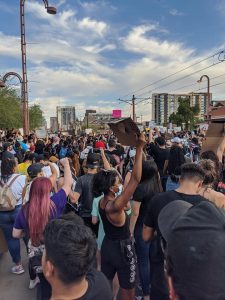Sharon Foster. Sharon is a JD Candidate (2022) at the Sandra Day O’Connor College of Law at Arizona State University. Sharon is the Director of Business and External Affairs for the Law Journal for Social Justice at ASU and is particularly interested in international human rights in the context of racial and gender equality.

“I can’t breathe! I can’t breathe! I can’t breathe!” We chanted George Floyd’s last words as we marched down Central Avenue on a sweltering summer evening. As we marched, the 107-degree heat radiated up from the downtown Phoenix streets. On May 25th, 2020, the day of George Floyd’s murder, I should have been 8,395 miles away in Timor-Leste beginning a summer internship at the Office of the Provedor for Human Rights and Justice (PDHJ). However, due to the Covid-19 pandemic, my internship with PDHJ went online. Though I wanted to be in Timor-Leste, working remotely provided me with a unique opportunity to fight police brutality in my own country, while researching and learning about challenges to police brutality in a new, developing country. This experience has also made me feel completely inadequate. As I sat down to begin research on the administration of justice and prisoners’ rights in Timor-Leste, I felt Americans had no right to evaluate police brutality in Timor-Leste.
At PDHJ, I am evaluating conditions in Timor-Leste on police use of force, rights of the accused, the efficiency of the judicial system, as well as prisoner treatment and prison conditions according to International Law. The issue of police brutality is especially pertinent as my own country grapples with challenges in responding to police violence.
In researching Timor-Leste’s international legal obligations, I learned how international laws extend to police action. Americans generally think of police oversight as a local, rather than a national or international, matter. Americans, from legislators to justices, have generally been aversive to citing international precedent as sources for creating American laws. However, under the International Convention on Civil and Political Rights (ICCPR), states must protect citizens’ right to life and prevent the arbitrary deprivation of life. Under the ICCPR and the Convention Against Torture (CAT), states must prevent torture or cruel, inhuman, and degrading treatment. The United States and Timor-Leste ratified the ICCPR and CAT and are subject to the obligations provided therein. I also found the United Nations has promulgated guiding principles including a Code of Conduct for Law Enforcement Officials (CCLE) and the Basic Principles for the Use of Force and Firearms by Law Enforcement to guide countries in monitoring police forces.
Under the ICCPR, law enforcement should use lethal force only in the most extreme situations and “only. . . to protect life or prevent serious injury from an imminent threat.” Human Rights Comm., Gen. Comment No. 36, ¶ 12. Lethal force cannot be used “to prevent a suspect or convicted persons escape unless they pose a serious and imminent threat to the lives . . . of others.” Id. States must prevent arbitrary deprivation of life by law enforcement officials. Id. at ¶ 13. Additionally, the CCLE comments state “the use of firearms is considered an extreme measure.” G.A. Res. 34/169, art. 3, ¶ c (Dec. 17, 1979). “Firearms should not be used except when a suspected offender offers armed resistance or otherwise jeopardizes the lives of others . . . .” Id.
Timor-Leste and the United States face some similar challenges in addressing police violence. These challenges include the police’s perception of their responsibility to the public, impunity for human rights violations, and militarization of their police forces. Some police officers may believe their primary duty is to arrest those they suspect are guilty instead of also considering their critical role in protecting the rights of all citizens, including criminal suspects. Additionally, police officers are rarely held accountable for their human rights violations.
There have been multiple accounts from Timorese citizens of excessive use of police force. For example, in 2018, a drunk police officer killed three teenagers and injured five others during a Timorese Independence Day celebration. Transparency and impunity remain problems in Timor-Leste. Americans are no strangers to police impunity. Some Americans were both relieved, because officer accountability is rare, and dismayed, at the lax sentencing, when a Dallas officer was convicted of murdering an African-American citizen in his home in 2018. Police militarization also poses a serious threat to harmony between police and citizens. For example, in 2015, Timorese police and military forces arbitrarily beat and arrested dozens of citizens while attempting to capture the leader of an illegal organization. CAT, Concluding Observations on the Initial Report of Timor-Leste ¶ 12 (Dec. 15, 2017). While in Timor-Leste police and military cooperation is concerning, in the United States, supplying police officers with military equipment has also caused concern.
One advantage that Americans have in monitoring police brutality is that the freedom of the press is enshrined in the Constitution and is widely respected. Americans have broad freedom to record, report, and publish instances of police brutality. Timor-Leste protects freedom of the press in its Constitution as well. However, in Timor-Leste media outlets often must rely on government financing which can impede press objectivity and curtail press freedom. To fulfill its constitutional and international obligations to prevent and prosecute police brutality, the Timorese government should improve access to information about instances of police brutality and inform the public about investigations. Timor-Leste must also ensure journalists or citizens who record and report instances of police brutality do not face criminal defamation charges.
George Floyd’s murder sparked conversations about and protests against police brutality world-wide. While protests were not reported in Timor-Leste, protests were seen in several of Timor-Leste’s neighbors, such as Indonesia, Australia, and New Zealand. International laws can help frame these conversations and inform citizens of their right to be free from police brutality. Some of my research for PDHJ considered how Timor-Leste could address police brutality and impunity, while allowing me to reflect on solutions to police brutality in the United States.